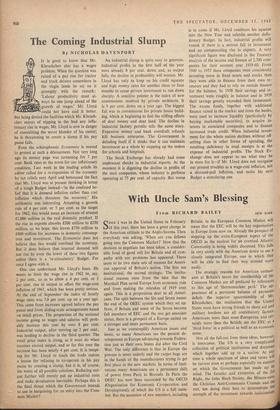With Uncle Sam's Blessing
From RICHARD BAILEY
NEW YORK
SINCE I was in the United States in February of this year, there has been a great change in the American attitude to the Anglo-Saxons. Then everybody was asking, 'When are you fellows going into the Common Market?' Now that the decision to negotiate has been taken, a consider- able fund of good will for Britain and of sym- pathy with our problems has appeared. There seem to be two main sets of reasons for Ameri- can approval of Britain's action. The first are institutional, the second strategic. The institu- tional reasons stem from the idea that the Marshall Plan saved Europe from economic ruin and from making the mistakes of 1919 over again. This is a proposition dear to all Ameri- cans. The split between the Six and Seven meant the end of the OEEC system which they set up. Now, if Britain and some of the Seven become full members of EEC and the rest get associate status, there is a prospect of a Europe united on a stronger and more permanent basis.
Just as we oversimplify American issues and items, so many Americans see the present de- velopments as Europe advancing towards Federa- tion just as their own States did after the Civil War. The only difference is that in Europe the process is more orderly and the carpet bags are in the hands of the manufacturers trying to get first place in the new markets. In terms of insti- tutions many Americans see a permanent shift of power from Paris to Brussels. In Paris the OEEC has now been succeeded by the OECD (Organisation for Economic Co-operation and Development), of which the US is a full mem- ber. But the accession of new members, including Britain, to the European Common Market will mean that the EEC will be the key organisation in Europe from now on. Already the prospect of stepping up the extra-European aspect of the OECD as the nucleus for an eventual Atlantic Community is being widely discussed. This falls in very nicely with the American desire to see a closely integrated Europe, one in which they will be able to find their way around more easily.
The strategic reasons for American enthusi- asm at Britain's move for membership of the Common Market are all prefaced by references to this age of 'thermonuclear peril.' The ap- pearance of a persistent balance of payments deficit, the superior spacemanship of Mr. Khrushchev, the realisation that the United States must have strong friends to share aid and military burdens are all contributory factors. Americans More than most Europeans, and cer- tainly more than the British, see the EEC as a 'third force' in a political as well as an economic sense.
Not all the fall-out from these ideas, however, is innocuous. The US is a very complicated collection of political institutions and doctrines which together add up to a nation. At any time a whole spectrum of ideas and views will be current even or perhaps especially on matters on which the Government has made up its mind. The fanatics and extremists of the far Right, the John Birch Society, the Minute-men, the Christian Anti-Communist Crusade and the rest, are doing their best to demonstrate the strength of the movement towards isolationism.


































 Previous page
Previous page